Trending Now
We have updated our Privacy Policy and Terms of Use for Eurasia Group and its affiliates, including GZERO Media, to clarify the types of data we collect, how we collect it, how we use data and with whom we share data. By using our website you consent to our Terms and Conditions and Privacy Policy, including the transfer of your personal data to the United States from your country of residence, and our use of cookies described in our Cookie Policy.
{{ subpage.title }}
Why cutting USAID will hurt American foreign policy
Ian's Quick Take: Hi everybody. Ian Bremmer here and a Quick Take for today on USAID, the US Agency for International Development, which is in the process of being shut down. Nearly all Washington staff have been put on leave, they're closing missions abroad, the State Department moving to evacuate all staff around the world. Why should we care? Does this matter? This agency was set up back over 50 years ago, 1961, by then President John F. Kennedy, and it was meant to coordinate the distribution of foreign aid for the United States all over the world and differentiate that from military support that was provided by the United States.
Secretary of State Marco Rubio has said that the US isn't providing charity, that's not what foreign aid is, that it should be providing support for US national interests. And I agree that it should be providing support for US national interest, but it is important to recognize that actually when USAID was set up, it was set up in part as charity, that President Kennedy's position was that the United States had a moral obligation to support poorer people, and poorer countries around the world. They are fellow human beings, after all, and the United States has historically benefited massively from developing resources all around the world, and frequently, the people that lived in those countries didn't get very much as a consequence, and the US has benefited massively, as have other wealthy countries, from industrialization, and putting carbon into the atmosphere that now poor countries can't do because of climate change, and we're saying, "We need to transition," but the US, of course, has gotten the benefits of that historically.
You know, my view is, I'm okay with charity. I actually think that helping save lives with food and medicine for millions of people and especially babies and children. I mean, even if it did nothing for the United States directly, I would be okay with spending some of the money of American taxpayers on that, especially as opposed to say a war in Afghanistan or the latest sort of bomber program that is expensive and more than the Americans need. So, I push back on the US should never do charity argument. But leaving that aside, you don't need that argument to focus on the importance of USAID.
And I want to, before I get into the national interest side, I do want to say I am empathetic with why it is unpopular. Because at a moment when so many average Americans feel like the US government has not taken care of them, and this is why you see so much backlash against all of the illegal immigrants that have not been addressed by administrations for many years, and why there's so much backlash against the US establishment, whether it's Democrat or Republican, in saying, "What about the average working American? What about our healthcare? What about our public school system? What about things that you should care a lot more about than sending aid to brown people around the world?" Which is essentially what USAID is mostly doing. I get that. And in that regard, it's an easy target for Trump. It's a particularly easy target for Elon Musk. I would ask first, "Why tax cuts for and regulations written by billionaires in the United States before poor people and Americans?" That would be my higher priority if I was really, really angry and antagonized by how badly money is being spent in the US. But that's a different story.
The point is you don't need to make the argument of charity. It is very clear that US foreign aid supports America's economic and national security interests. It is growing markets for consumers, for American businesses and products all over the world. The US has the biggest businesses. It has the biggest market. It benefits the most from other countries around the world having more capacity to sustainably consume and engage with those businesses. America benefits in having more health security by containing disease and pandemics because those diseases and pandemics don't suddenly stop at the American border. The US benefits from aid that reduces insurgencies creating instability that leads to more illegal migration all over the world, many of whom ultimately end up in the United States. It creates more economic opportunity and safety and security in origin countries. And that is a carrot that matters. It's not just about sticks. It's a carrot for economic statecraft that gives the Americans more influence as opposed to say the Russians, or more importantly the Chinese.
Because getting rid of USAID and cutting back on all these programs creates a vacuum. And that is an opportunity for adversaries. I've already seen ministers from large African countries who have their American programs getting cut off, reaching out immediately to their counterparts, ministers in China saying, "Are you willing to send in the programs to replace the Americans that are leaving?" And China doesn't have the economic wherewithal, the Americans do, but they certainly will seize opportunities that are economically useful to them, long-term, because they have a much longer-term perspective on these things than a US administration that's gone in four years. So I worry about that.
I think that USAID has been America's principle interlocutor with civil society in developing countries. And to the extent that we care about those countries having systems that are more aligned with the values and standards that the United States has historically promoted, then you don't want to undermine that and allow the Chinese to come in, which has very little interest in civil society, indifferent to civil society. It's a source of intelligence for the United States. And we've seen that even if it's sometimes uncomfortable for the local governments who aren't necessarily in favor of that. It is true that all USAID projects are probably not going to ultimately be killed, that the State Department is going to take it over and Marco Rubio has said that, "There's a lot of corruption in USAID, and a lot of this money is misspent, and is spent badly, and breaks executive orders," and I am sure that is true, and I am sure that that corruption needs to be addressed. It wouldn't surprise me. The US is an incredibly bloated government system. But shooting first and asking questions later tends to kill innocencts. And that is of course the approach here. And the reality is, that Elon and Trump and their ability to act and be destructive is much greater than the damage control that the secretary of state can do at this moment. And the State Department just does not have the people or the infrastructure to execute on a lot of these programs once USAID is shut down.
And the message that this is really sending to allies is that the United States is an unreliable partner. You cannot count on it. That what they say to you in one administration is not going to be consistent in a second administration, in a way that is not true with other countries, most other countries, around the world. And so I continue to believe, as I did before Trump was inaugurated, that the US is going to see a lot of wins. A lot of countries are going to bend to his will because he's more powerful and he's willing to use that power directly. But that does not mean that the United States will long-term succeed in a law of the jungle approach, an approach which is all stick and no carrot, even when the stick is very, very big, but you can't wield it effectively for a long period of time. And other countries are learning that carrots are kind of smart. I mean, the Chinese originally perfected the all stick and no carrot approach and then saw that the United States was more effective in a lot of countries because they also had economic statecraft. They also had these commercial levers, and so the Chinese started saying, "Oh, we need to figure out how to deliver aid to a lot of these countries, doesn't have to be transparent, can work right with the governments, but ultimately that's going to give us more influence in these countries." And that is something that President Trump and his administration in the early weeks at least seemed to be jettisoning.
So I think this is Pennywise pound foolish. I think it is short-term beneficial to Trump and will look like a win for him and his base and long-term will undermine US power around the world and will of course make the world a less stable place. So on balance, I think this is a problem. It's not something that I think is going to go well. I would love to be proven wrong. I'll be watching it carefully and I think it's a good thing to be debating.
So that's it for me, and I'll talk to you all real soon.
Rescued miners are seen as they are processed by police after being rescued at the mine shaft where rescue operations are ongoing as attempts are made to rescue illegal miners who have been underground for months, in Stilfontein, South Africa, January 14, 2025.
South African authorities haul dozens of bodies from mine siege
South African police said Wednesday that rescuers had recovered 78 bodies and 246 living miners this week from an abandoned gold mine near Stilfontein, southwest of Johannesburg, that has been the site of a tense siege since August. Hundreds more miners were believed to be hiding underground, but rescue volunteers were unable to locate them.
The miners have been hesitant to leave the mine and have gone for months without natural light, including periods without food and water, because police arrested those who surfaced. Over 1,500 miners have been detained since August, and some have been deported.
Vulnerable migrants. The majority of the arrested miners came from Mozambique, Zimbabwe, and Lesotho to seek a better life in South Africa. Instead, they were targeted by criminal gangs that took over abandoned commercial mines and forced disadvantaged migrants to risk their lives extracting what little valuable ore remains.
The men in Stilfontein managed to send letters and pictures via an improvised pulley system that friends and family used to send them food and water. Images of emaciated men sitting among what appeared to be the remains of colleagues have shocked the Rainbow Nation, but police say they are determined to crack down on illegal mining.
Political waves. Tackling the heavily armed gangsters who control the mines, however, will be tough. And the siege threatens to upend politics in Johannesburg, where a delicate alliance between the African National Congress and the Democratic Alliance has held together against all expectations since last summer. The DA is calling for an independent inquiry into the mine operation, and we’ll be watching for cracks in the coalition.
A drone view shows the Canada-U.S. border between the U.S. state of New York and the Canadian province of Quebec, near Champlain, New York, U.S., December 6, 2024.
Hard Numbers: Canada’s immigration crackdown shows results, BC free contraception measure boosts birth control, Pentagon flags China’s growing nuclear arsenal, Americans aren’t thrilled with their jobs, US government tells top pols to “get off the phone”
0.4: In the third quarter of this year, Canada’s population grew just 0.4%, the lowest quarterly growth rate in two years. Given that immigrants account for almost all of Canada’s population growth, the data suggest that new government measures to slow immigration – including capping foreign student slots and slashing temporary work visas – are having an effect. Immigration skyrocketed during the pandemic, straining housing supply and services, provoking a political backlash.
10: The decision by the BC government last year to make birth control products free has caused a 10% jump in women’s use of contraceptives. Use of pricier options such as IUDs and implants, the cost of which is now fully covered by the state, jumped 14%.
20: China’s arsenal of operational nuclear warheadsgrew by 20% over the last year, reaching 600, according to the Pentagon. At his clip, Beijing will have 1,000 warheads deployed by 2030. That would still trail the roughly 1,600 nuclear warheads deployed by Russia and the 1,800 deployed by the US, but it only takes a handful to inflict unspeakable destruction. So far, China is not party to any agreements with the US and Russia on limiting nuclear arsenals.
50: How do Americans feel about their jobs? So-so. Only 50% say they are extremely or very satisfied with the daily grind, according to a new Pew study. But the generational divide is stark: 67% of workers aged 65 or older viewed their jobs in the best light, a whopping 24 points higher than people aged 18-29.
8: The US government is telling senior officials and politicians to GET OFF THE PHONE. Literally. Authorities want top pols to ditch phone calls and text messages, after at least eight US telecoms companies were hacked by the “Salt Typhoon” group of China-linked cybercriminals. Authorities say it’s safer to use end-to-end encrypted text apps like Signal, WhatsApp, iMessage, Teams, or Zoom.
GZERO reveals the top 10 geopolitical game changers of 2024
2024 was a year of dramatic reversals. Some came at the ballot box, where long-ruling parties took a beating, anti-establishment figures stormed into power, or strongmen managed to see off what looked like fatal challenges. Some came on battlefields, where deadlocked conflicts began to break in one direction or another. And some came in how we think about politics and geopolitics more broadly.
This week, as we hurtle toward 2025, another year that promises to be pivotal in global affairs, we profile 10 people who, for better or worse, flipped the script, beat the odds, turned the tables, or otherwise changed the game in 2024.
GZERO's No. 10 2024 Game Changer: Italy’s Iron Lady
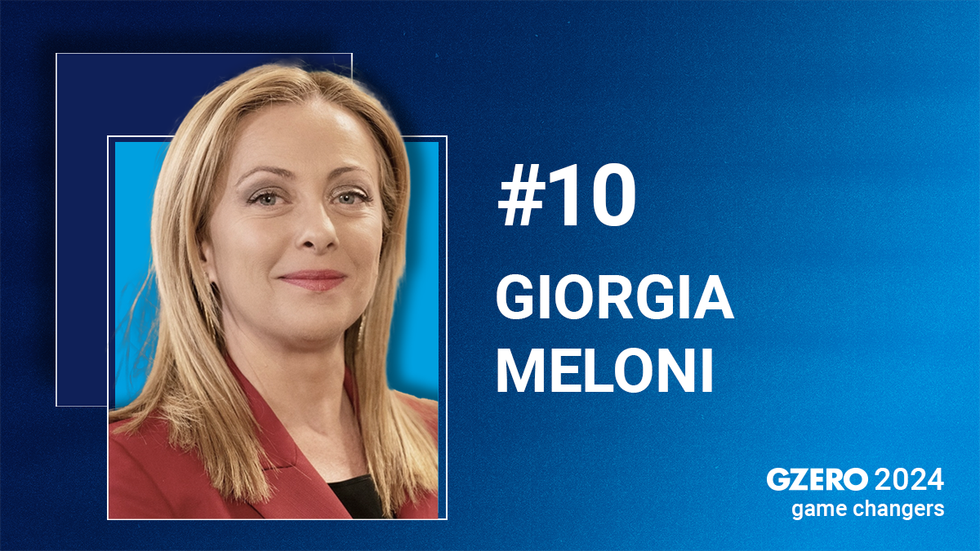
Who is she? Giorgia Meloni, 47, is Italy’s first female prime minister and the leader of the right-wing Fratelli d’Italia – Brothers of Italy – party. A staunch nationalist, Meloni rose to power in 2022, pledging to prioritize “God, family, and fatherland.” As a student, she was active in the neo-fascist Italian Social Movement before becoming Italy’s youngest-ever minister in Silvio Berlusconi’s government in 2008.
What did she accomplish in 2024? Meloni led her party to victory in Italy’s June elections, positioning herself as the “kingmaker” in the European Parliament. Her victory was due in part to her tough stance on migrants: Last year, Italy cut illegal immigration by 64%, inking agreements with Tunisia to reduce human smuggling and encouraging the EU to do the same with Egypt.
Meloni has faced pushback from Italian courts, however, on her plan to send migrants to Albanian processing centers. Herwide-ranging constitutional reforms to enhance executive power, including allowing the direct election of the prime minister, have also raised concern about potential shifts toward authoritarianism.
How has she changed the game? Meloni's migration crackdown found favor with other European leaders, including Hungarian President Viktor Orban. At the same time, she maintained strong support for Ukraine, recently authorizing Italy’s tenth military aid package for Kyiv. “Meloni has had a good year, and her fellow EU leaders in capitals and Brussels now hope she has been fully co-opted into the European mainstream,” said Mujtaba Rahman, Eurasia Group’s managing director for Europe.
What’s next for 2025? Meloni’s big domestic challenge is economic: Italy’s GDP is poised to grow by an anemic .5% in the coming year. Parliament passed several budget measures last week, including a one-off €100 Christmas bonus to 4.5 million disadvantaged families, and will continue allowing taxpayers to pre-pay their taxes for the next two years, regardless of how much they earn.
On the foreign policy front, Meloni may have an in with the incoming US administration in Elon Musk, with whom she famously traded compliments after he introduced her at the Atlantic Council’s Global Citizen Awards in October. However, Musk was subsequently seen to overstep when he criticized Italian judges who blocked deportations. And the two notably differ on future support for Ukraine. Time will tell whether Rome and Washington enjoy la bella vita – or not.
GZERO's No. 9 2024 Game Changer: Venezuela’s Strongman
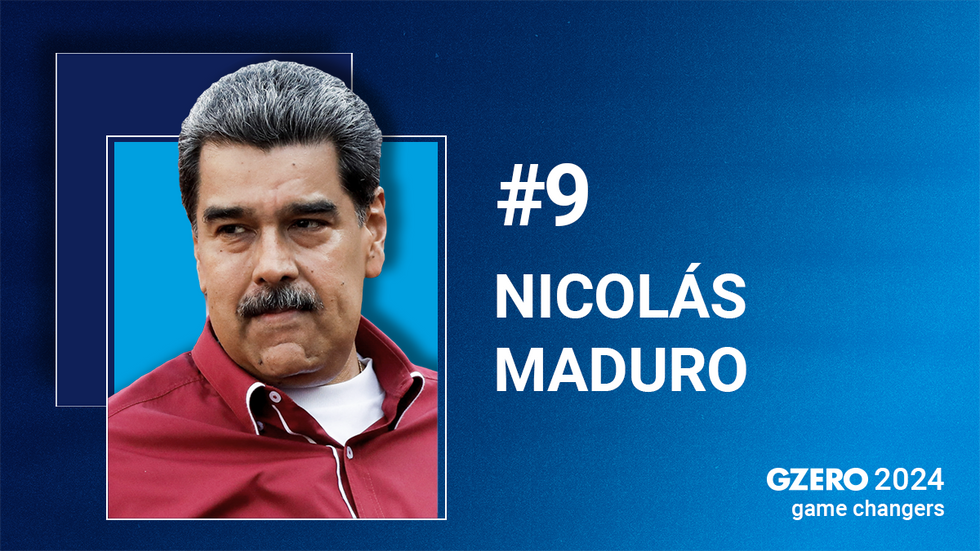
Who is he? Venezuela’s President Nicolás Maduro has been in power for 11 years, and over the past seven of those years, he has presided over one of the most spectacular social collapses in the world. Economic mismanagement, political repression, and tight US sanctions prompted more than seven million people to flee in a migrant exodus that has reverberated across the region, from South America to South Brooklyn.
What did he accomplish in 2024? Heading into the presidential election this past July, then, it seemed almost certain that the game was up for Maduro. His approval ratings were in the gutter. A historically splintered opposition had united behind a single, reasonably popular candidate. The polling was so skewed against him it seemed like he’d have to steal the election outright to stay in power.
And that’s what he did. Even as all available evidence – including thousands of voter rolls from across the country – suggested he had lost in a landslide, his government published figures showing that he had won a narrow victory. And since then, that has been that. Threats and enticements from the US have failed to budge Maduro. His police have cracked down ferociously on the opposition. He appears to be going nowhere.
How has he changed the game? Maduro has reset what looked like a losing game not only for himself but also for various outside powers that had hoped to see him gone.
What’s next for 2025? Perhaps the most interesting piece of this story will involve the US and the incoming Trump administration.
Trump has pledged to deport millions of undocumented migrants, and many of them are Venezuelan. Where will they go? Repatriation to their home country will require an agreement of some kind with Maduro.
Trump’s Secretary of State nominee, Sen. Marco Rubio, is a Cuban-American who is ultra-hawkish on the communist regime in Cuba as well as its “21st-century socialist” backers in Caracas. If Rubio had his druthers, both governments would be out of power, but he will now need to deal tactfully with Maduro, who has shown that he is, for better or worse, to be reckoned with rather than written off.
“While Trump’s team has hinted at space for a negotiation related to migrants,” says Eurasia Group's Latin America Director Risa Grais-Targow, “the president-elect’s specific history with Maduro, loyalty to Florida voters, and preference for US oil and gas production will limit the scope for a grand bargain and further sanctions relief.”
GZERO’s No. 8 2024 Game Changer: South Africa’s divisive populist
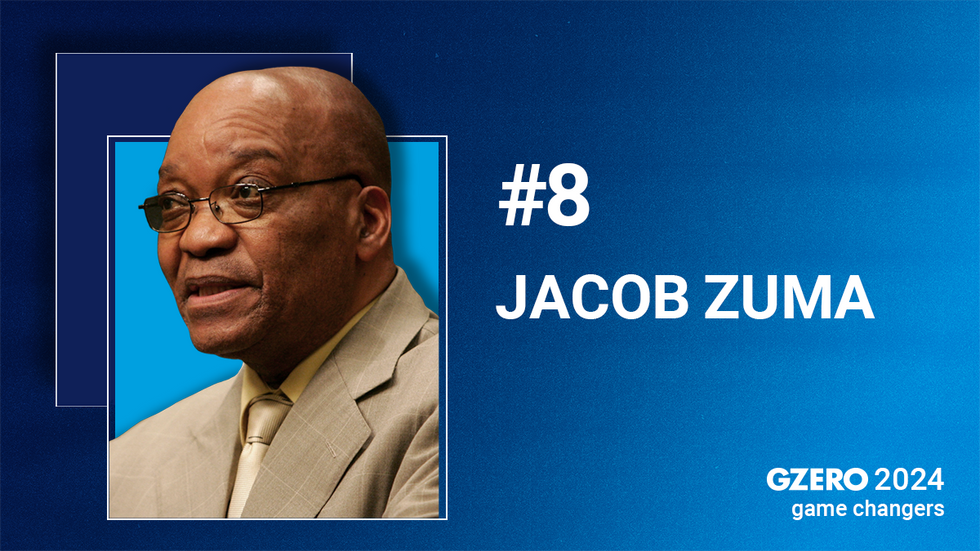
Who is he? It’s not often a former president continues to play a crucial role in the longer-term direction of his country’s politics, but Jacob Zuma is no ordinary former president. From 2009-2018, the charismatic Zuma led the African National Congress and served as South Africa’s president. A series of corruption allegations forced him from power, and Zuma felt he’d been betrayed by his deputy, Cyril Ramaphosa, who is now the ANC’s leader and South Africa’s president.
What did he accomplish in 2024? In 2024, three years after he served two months in prison on a corruption-related charge, Zuma came for his revenge. He formed a brand new political party — uMkhonto we Sizwe, or MK — and ran again for president. The new party didn’t come close to winning nationally, but by drawing 45% support in Zuma’s home region, KwaZulu-Natal, he helped strip the ANC of its national majority.
How has he changed the game? The ANC, Nelson Mandela’s party, the political embodiment of liberation from apartheid, saw its national vote share fall from 57% in 2019 to just 40% in 2024. That stunning result then forced the ANC to invite the largest opposition party, the Democratic Alliance, to form a government of national unity. This is the first time the ANC has had to share national political power since the end of apartheid more than three decades ago.
Zuma’s ambitions were not the only factor that pushed down the ANC’s vote share so sharply. South Africa is still plagued with high unemployment, inflation, corruption, crumbling infrastructure, and a lack of economic opportunity for young people. But, according to Eurasia Group Africa expert Ziyanda Stuurman, “there is a direct line between Zuma’s political maneuvers [in 2024], and the emergence of a coalition government few people would have ever thought was possible.”
What’s next for 2025? It’s too early to say whether forcing the ANC to work with the opposition DA will prove positive or negative for South African politics, but it’s clear that Jacob Zuma changed the political game this year in his country. His challenges to Ramaphosa’s government will continue into 2025.GZERO’s No. 7 2024 Game Changer: Citizens who said ‘No’ to status quo
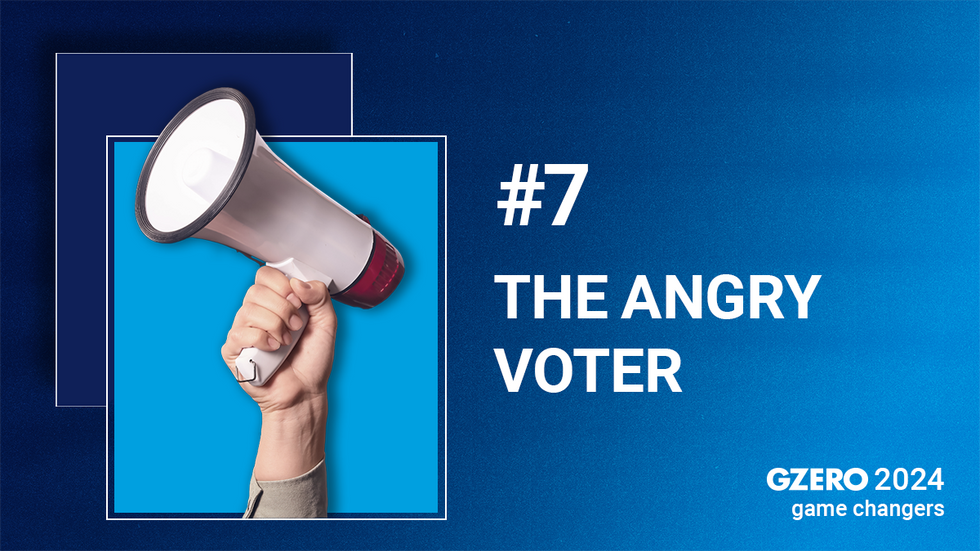
Who are they? Voters went to the polls this year in more than 50 countries with a combined population of more than 3.5 billion. A lot of them had strong messages to send their elected leaders.
What did they accomplish in 2024? In June, voters in India stunned outside observers by stripping the still-popular Prime Minister Narendra Modi’s Bharatiya Janata Party of its majority in parliament. The result forced the BJP to turn to fickle allies to pass more of Modi’s reform agenda and limited his room for maneuver.
Also in June, voters in South Africa made history by depriving the African National Congress of its majority for the first time in the country’s post-apartheid history. With just 40% of the vote, the ANC was forced to invite the opposition Democratic Alliance to form a unity government — one that has held together contrary to expectations, it must be said.
In July, voters in France punished their centrist President Emmanuel Macron by casting ballots for enough far-left and far-right parties to gut the political center. After struggling to form a government to advance state spending reforms, left- and right-wing parties came together to force Michel Barnier, a compromise choice for PM, out of his job. France’s political crisis continues.
Also in July, fed-up voters in the UK ended 14 years of rule by the Conservative Party in favor of Labour, led by new Prime Minister Sir Keir Starmer. The Conservatives' share of parliamentary seats fell from 252 to just 121, in part because Nigel Farage’s new Reform UK party drew much of the Tories’ support. And British politics has only become more combative. A November poll found that the percentage of UK adults with an unfavorable view of Starmer’s work as PM outnumbers those who approve by well over two to one.
In October, a shock election result in Japan cost the Liberal Democratic Party its majority in the Diet, the country’s legislature. The LDP has held power almost continuously for nearly 70 years.
In November, Donald Trump carried all the so-called swing states in a victory that will replace President Joe Biden and Vice President Kamala Harris with a Republican Party administration.
“Unemployment hurts a small number of people a lot, but inflation irritates everyone,” notes Eurasia Group’s Vice Chairman Gerald Butts. “Incumbents are discovering that hurting all of the people even some of the time makes the whole country angry at their government.”
GZERO’s No. 6 2024 Game Changer: Russia’s ruthless leader
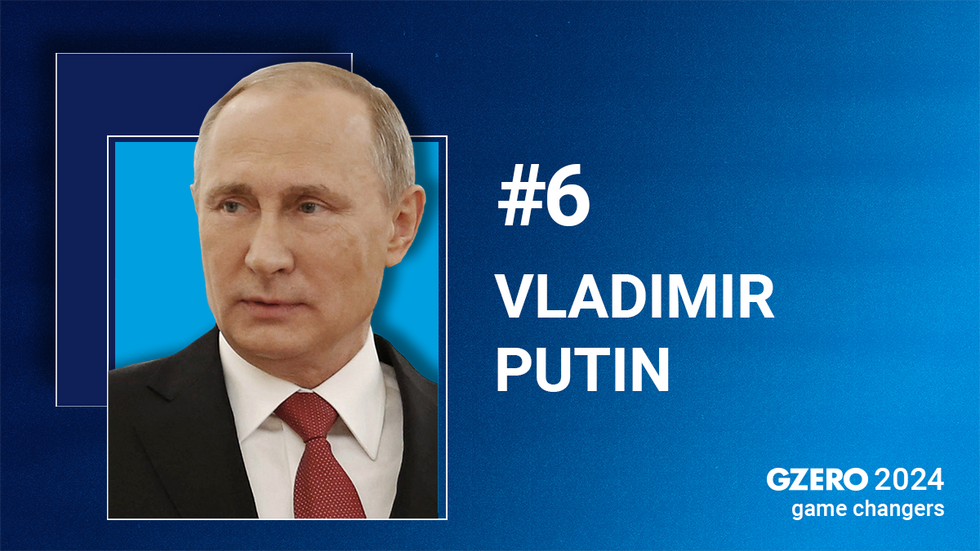
Who is he? Vladimir Putin, the ex-KGB agent who has ruled Russia without interruption since the turn of the millennium, hardly needs an introduction – you know the name. But even after nearly a quarter century in power, he continues to flip scripts year in and year out, and 2024 was no different.
What did he accomplish in 2024? As recently as a year ago, Ukraine and its Western backers still held out hope that Kyiv’s forces might push back the Russian invaders who have laid waste to so much of the country since the 2022 invasion. Since then, Putin has – slowly, cynically, but successfully – shown otherwise.
Today, Russian forces are grinding their way westward in the Donbas while Ukraine suffers shortages of manpower. Kyiv’s bid to divert Russian attention from Eastern Ukraine by invading a small corner of Russia itself in August hasn’t worked out – Putin didn’t take the bait, instead calling in North Korean troops to help repel the Ukrainian incursion.
Meanwhile, US President-elect Donald Trump has questioned support for Ukraine and pledged to end the war “in 24 hours.”
How has he changed the game? By altering perceptions of what’s possible. “In 2025, Ukrainian society will be reassessing their all-or-nothing view of victory,” says Tim Mak, editor of “The Counteroffensive” in Kyiv. “As a democratic country, Ukrainians are increasingly expressing a willingness to negotiate -- and a fear that continuing the war could lead to frontline disaster due to manpower shortages.”
What’s next for 2025? Not everything is roses for Putin these days. His heavily sanctioned economy grows only because of massive military spending. Inflation is high. The population continues to shrink, as birth rates are low and hundreds of thousands of talented young people have left in opposition to the war. Russian casualties in Ukraine now dwarf those of the late Soviet Union in Afghanistan. Globally, Moscow is increasingly the junior partner to a rising China, and the Kremlin just lost Syria, its most important ally in the Middle East.
But heading into 2025, Putin has set himself up to negotiate over Ukraine, and potentially over other issues, from a position of greater strength than many had believed, or hoped, just a year ago.
Honorable Mention: Kim Jong Un
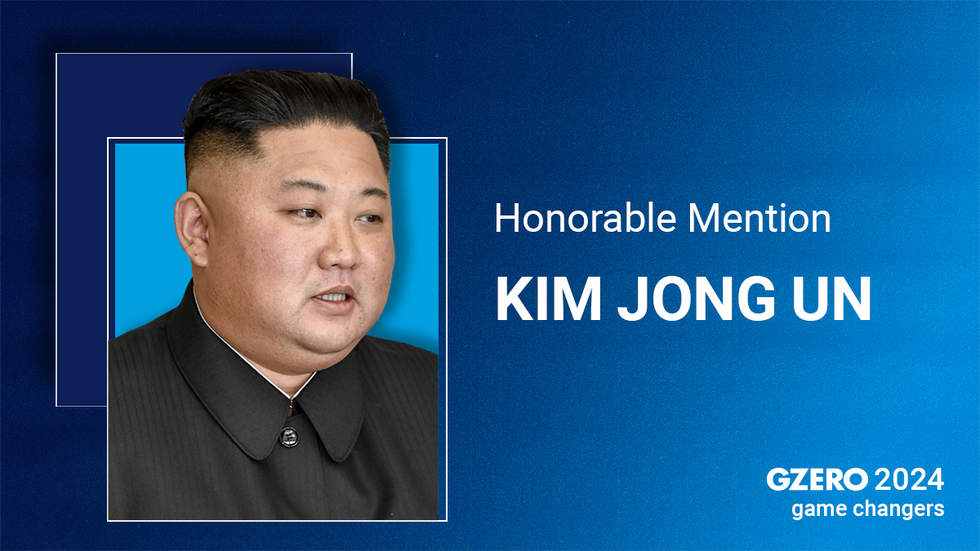
Who is he? Kim Jong Un, the 40-year-old Supreme Leader of North Korea, has been at the helm of the Hermit Kingdom since his father, Kim Jong Il, died in 2011. Following a ruthless consolidation of power, he has directed his energy and the state’s meager finances toward expanding the country’s nuclear weapons program, which he sees as central to North Korean security and sovereignty.
What did he accomplish in 2024? He concluded a mutual defense treaty with Russia while hosting President Vladimir Putin in Pyongyang in June — the first visit to the city by a Russian leader in a quarter century — that laid the groundwork for his deployment of troops to fight in Ukrainian-occupied areas of Russia. The deployment is a major escalation compared to the weapons aid he has been supplying Moscow since 2023, though thus far he has acted with total impunity. That treaty also opened much deeper cooperation with Russia to advance North Korea’s military technology, including progress on nuclear-powered submarines and a more powerful ballistic missile as well as attempts to launch spy satellites.
Kim radically overhauled his government's policy toward South Korea. In January, he renounced the goal of reunification with the South, officially removing it from the constitution. He also rather theatrically destroyed road and rail links to the south, constructed during a period of rapprochement at the turn of the 21st century.
How has he changed the game? By changing the terms on which it’s played. “The dramatic deepening of North Korea-Russia diplomatic and security ties in 2024,” says Eurasia Group expert Jeremy Chan, “has given Pyongyang more strategic optionality and greater assurance that neither South Korea nor the US will attempt an invasion.”
Seoul and Washington can’t credibly threaten military action without running unacceptable risks, and Kim’s control over domestic affairs still appears iron-clad. What’s more, by deepening relations with Moscow, Kim puts pressure on his frenemies in Beijing, who have few tools at their disposal in the relationship besides accommodation.
What’s next for 2025? If Kim has his druthers, talks with Donald Trump to secure recognition of his nuclear status. “These various nuclear and defense-related capabilities attained in 2024 will provide Kim with leverage in future negotiations with Trump,” says Chan, “while allowing Pyongyang to retain its hard-won nuclear deterrent, something which Kim has vowed will never be bargained away.”
Couple that with political chaos in the South after Yoon Suk Yeol’s attempted coup in early December, and it’s looking like the peninsula is in for a wild ride next year.
GZERO’s No. 5 2024 Game Changer: The Syrian rebel who reshaped the region
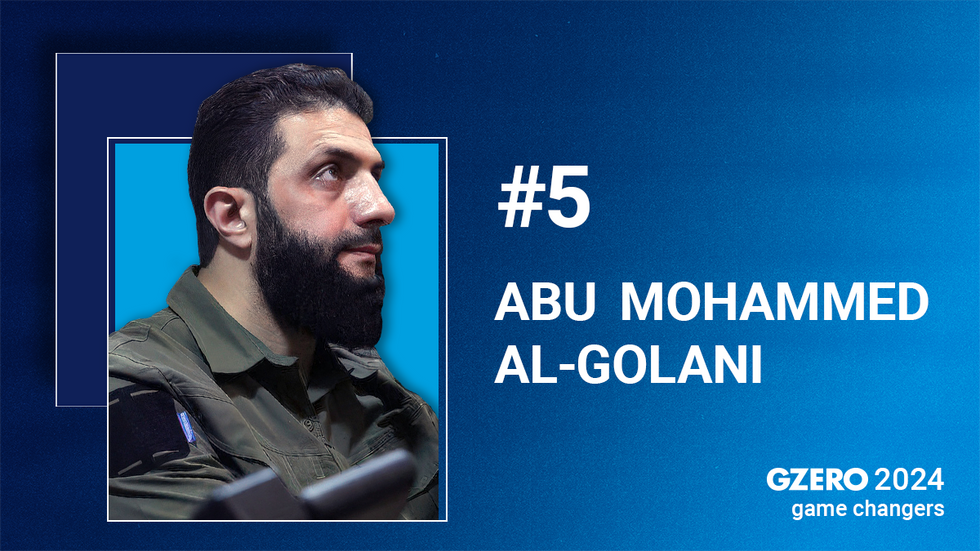
Who is he? The 42-year-old leader of the Syrian jihadist group Hayat Tahrir al-Sham, or HTS, al-Golani, born Ahmed Hussein Al-Shara, grew up in a middle-class Syrian family. He went to Iraq in 2003 to fight with al-Qaida against the US occupation, taking his nom de guerre “al-Golani” to honor relatives displaced from the Golan Heights, an area of Syria that Israel has occupied since 1967.
After the Syrian civil war began in 2011, al-Golani founded the anti-Assad jihadist Nusra Front group, which later rebranded as HTS.
In recent years, as he established control over northwestern Syria, al-Golani has sought to distance himself from global jihad and present himself as a statesman interested in stabilizing Syria.
What did he accomplish in 2024? In early December, HTS led a military campaign that surged across the country, capturing key cities within days. When the Syrian regime’s longtime backers in Russia and Iran failed to send more support to Bashar Assad, the game was up. In little more than a week, al-Golani’s forces had toppled the 54-year-old House of Assad.
How has he changed the game? The collapse of the famously despotic Assad regime has sent shockwaves through the region. Syria, for decades a bulwark of expanding regional power for Shia Iran, as well as Russia, is now under the nominal control of HTS, a Sunni group with links to Turkey, a country politically at odds with most major Arab powers. Israel is watching warily and has already struck at Syrian arms depots to prevent them from falling into the hands of anti-Zionist groups. Donald Trump wants the US to “stay out of it,” but he’ll inherit the nearly 1,000 US troops in Syria fighting Islamic State remnants. Iran and Russia, for their part, can hardly be expected to simply fade away.
What’s next for 2025? Al-Golani’s rule is barely a week old. He must establish order in a fractious country wrecked by more than a decade of brutal civil war. Can he? And will his vision of Syria allow the country’s sectarian minorities to live in peace and dignity? Is there a world where the 7 million Syrian refugees who have gone to Turkey and Europe since 2011 really choose to return?
In some ways, “the collapse of the Assad regime is the Middle East’s most hopeful moment in over a decade,” says Firas Maksad, a senior fellow at the Middle East Institute in Washington, DC. “But it carries within it the seeds of further communal and regional conflicts that could persist for a decade to come.”
What we know for sure is that al-Golani’s forces have already smashed decades-old assumptions about the balance of geopolitical, regional, and sectarian power in a volatile region. Whatever comes next begins now.
GZERO’s No. 4 2024 Game Changer: Israel’s political survivor
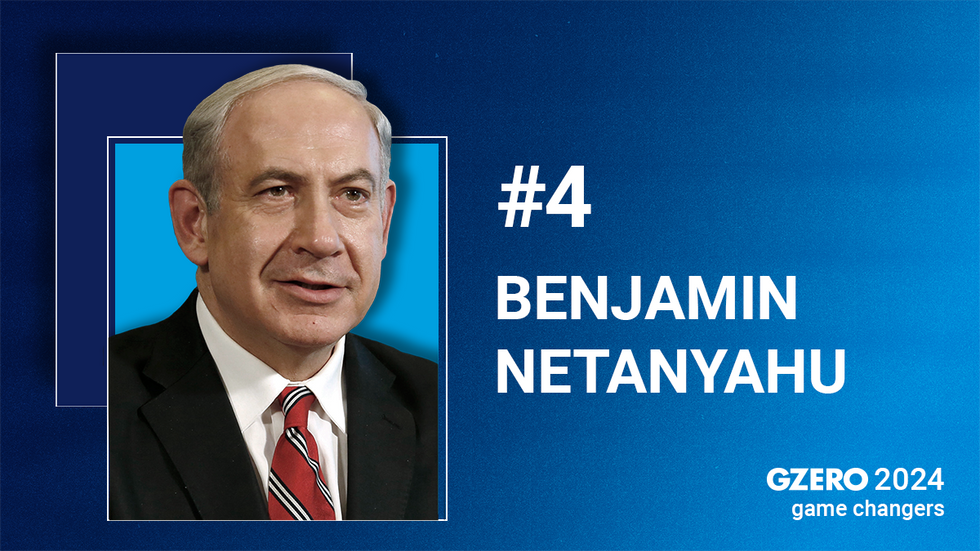
Who is he? Israel’s longest-serving prime minister, Benjamin Netanyahu leads the right-wing Likud Party. He was the first Israeli prime minister elected by direct popular vote in 1996 and served until 1999. He regained the premiership from 2009 to 2021, and then again in November 2022. His latest administration has been marked by the Oct. 7, 2023 attack by Hamas, mistreatment of Palestinian groups, limiting the Supreme Court’s power, and his own legal challenges, including charges of bribery and fraud.
What did he accomplish in 2024? Netanyahu has, as he promised in the wake of Oct. 7, reshaped the balance of power in the Middle East.
He has greatly weakened Israel’s adversaries, Hezbollah and Hamas, eliminating Hamas leader Yahya Sinwar and Hezbollah chief Hassan Nasrallah. Israel used the fall of Syria’s Assad regime as an opportunity to take control of areas in Syria beyond the Golan Heights and take out its neighbor’s military capabilities. Meanwhile, doubts about Israel’s deterrence abilities following Oct. 7 have been restored after it largely shot down all of Iran’s retaliatory missile strikes.
Eurasia Group’s Senior Analyst Greg Brew says Netanyahu’s greatest triumph was overseeing the war against Hezbollah, which decimated the group’s leadership, killed thousands of its fighters, and degraded its capacity to strike Israeli cities, without triggering serious retaliation.
How did he change the game? Netanyahu began 2024 with 85% of Israelis calling for his removal and officials circulating petitions calling him an “existential threat” to the country over his handling of the Gaza War. He is accused of abandoning the Oct. 7 hostages and prolonging the war for his own benefit.
"Netanyahu began 2024 still dealing with the aftershocks of October 7 - military, political and social - and a full-fledged offensive in Gaza," says Tel Aviv based journalist and advisor at Israel Policy Forum Neri Zilber. "The ensuing year saw him slowly grind down his opponents both domestic and foreign, following one overarching objective: playing for time and remaining in power. And it worked probably better than he could have ever expected."
He ignored US demands to treat Gazans humanely, calling Washington’s bluff over withholding military aid if Israel did not increase the flow of food and humanitarian aid. However, doing so has further alienated Israel on the global stage, leading global institutions, leaders, and human rights groups to accuse Netanyahu of committing genocide in Gaza.
Nevertheless, he is ending the year with a 47% approval rating, seeing his popularity rebound after his aggressive campaign against Hezbollah and Iran. “Netanyahu is looking much stronger than he was six months ago,” says Brew. “The war against Hezbollah, the strikes on Iran, and the decimation of Hamas has strengthened his claim to be the strongest figure ensuring Israel’s security.”
While centrist figures like Yoav Gallant and Benny Gantz have departed his cabinet, forcing Netanyahu to rely more heavily on far-right figures, “he has kept his coalition together and looks likely to do so in 2025,” explains Brew.
What to expect from him in 2025? The coming year will open up various possibilities for Netanyahu. "He has the option of simply holding on to power and continuing the grinding low-level war in Gaza; he can opt to cut a deal for the hostages in Gaza, even at the cost of halting the war, and use it as leverage for a larger peace deal with Saudi Arabia," predicts Zilber.
In the year ahead, Netanyahu is likely to benefit from and be emboldened by the Trump administration. Donald Trump shares Israel’s hatred of Iran, supports the Gaza War ending on Israel's terms, and has appointed Mike Huckabee, who is vocally in support of Israeli settlements in the West Bank, as the ambassador to Israel. Netanyahu's dependence on far-right figures like Itamar Ben-Gvir and Bezalel Smotrich will constrain his options when it comes to normalizing relations with Arab states like Saudi Arabia — something Brew says is certain to be a US priority under Trump.
But with US support all but guaranteed and public sentiment back behind him, Netanyahu is likely to continue his aggressive maneuvers in the Middle East into 2025.
“Netanyahu’s foreign policy priority in 2025 will be addressing the threat posed by Iran, and specifically Iran's nuclear programs,” says Brew. “I expect this to be the focal point in his relationship with Trump, along with issues of importance to his coalition, such as confirming US support for the settlement of territory — and perhaps even the partial annexation — of the West Bank.”
GZERO’s No. 3 2024 Game Changer: Those responsible for global migration
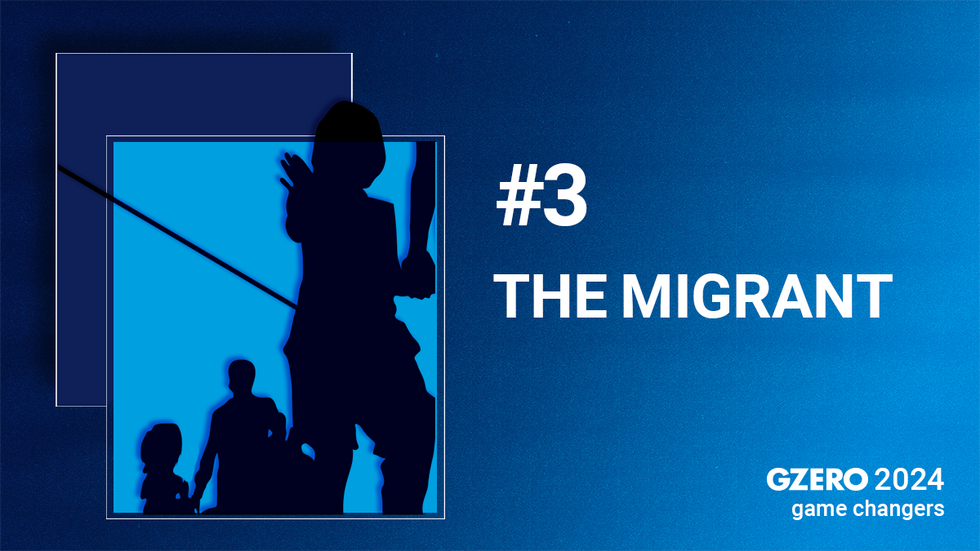
Who are they? The migrant took many forms in 2024, driven by armed conflicts, economic downturns, and the promise of opportunity – but their numbers fell as countries clamped down and closed borders. Irregular crossings of Middle Eastern and African migrants to Europe dropped by 42% in the first nine months of the year. Latin American migrants pursued better economic prospects in the US, but their numbers also declined sharply. Asian and South Asian emigres moved to Australia and Canada for education and jobs, but those countries also cut numbers back. In Africa, South Africa implemented a points system to prioritize skilled workers, while intra-continental migration surged in the North due to unrest in Sudan.
What did the migrant accomplish in 2024? Economically, migrants played a crucial role in labor markets, filling gaps in sectors like agriculture, healthcare, and technology. In some countries, their economic impact helped stave off a recession. But some migrant groups exacerbated social tensions, notably around issues that engaged their diasporas, such as the Israel-Hamas War, and also put a strain on cash-strapped public services.
And the latter issue caused a backlash among voters. “Since the pandemic, there has been a major increase in the number of immigrants, primarily legal ones, to Canada, the US, Europe, and the UK to address labor shortages,” said Graeme Thompson, senior analyst at Eurasia Group. “The problem is that first, those numbers increased very rapidly to historically unprecedented levels, and second, that has been combined with preexisting stresses on housing and social services. And that combination has proved politically explosive."
How did the migrant change the game? This past year, the migrant shaped elections around the world. Illegal immigration was the pivotal issue in the US presidential election, as now-President-elect Donald Trump accused the Democrats of failing to control America’s borders and blamed illegals for a surge in crime. In Europe, Austria's general election campaign was dominated by migration issues, with the far-right Freedom Party advocating for stringent asylum policies, while in Germany and Italy, anti-immigration parties saw a surge in support. Immigration was a key election issue in South Africa, where the ANC lost its majority as opposition parties pushed anti-migrant policies.
What to expect in 2025? The migrant will remain a source of tension as countries continue to clamp down on illegal immigration. Trump’s deportation plans could provoke a surge of migrants to Canada, prompting the Canadian government to announce a billion dollars in spending to harden its southern border. European countries, meanwhile, have stopped processing the claims of Syrian refugees in the wake of Bashar Assad’s overthrow, and many refugees plan to return home. But it remains to be seen whether the new regime will provoke a new exodus as minority groups such as the Kurds may feel under threat. The impact of immigration on housing has become a central issue in Canada and Australia, both set to have elections in 2025. And in Africa, the ongoing war in Sudan has displaced 11 million people and doesn’t look to end any time soon.
GZERO’s No. 2 2024 Game Changer: Billionaire entrepreneur
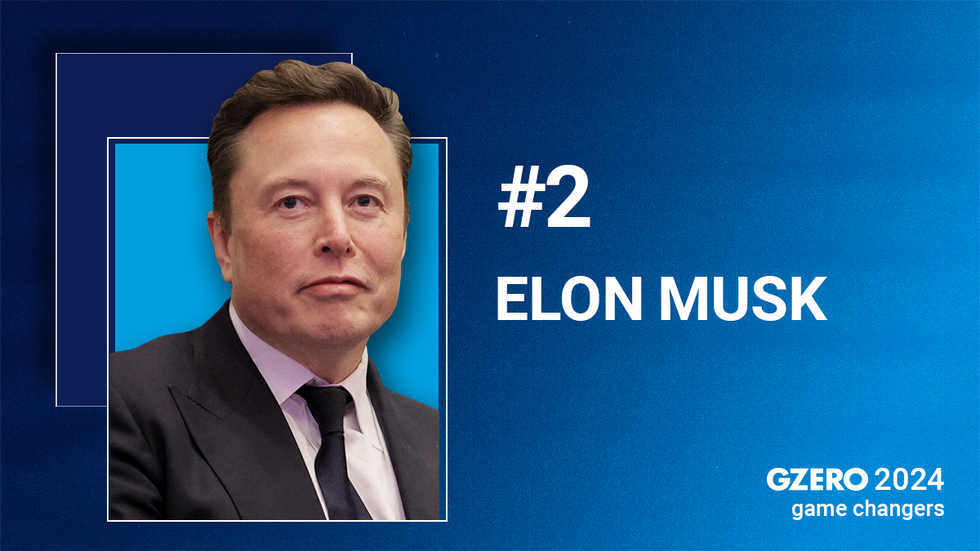
Who is he? The CEO of X, Tesla, and SpaceX, Elon Musk is the wealthiest and possibly the most powerful private citizen in the world. He controls a revolutionary space company, America’s top electric vehicle producer, and a big chunk of the global public square formerly known as Twitter. In 2025, he’s set to be the beneficiary of the biggest political bet of 2024: spending over $100 million in donations andleveraging his 200-plus million followers on X to support a Trump win for the American presidency.
What did he accomplish in 2024? In 2024, Musk became a political kingmaker. Musk’s financial and technological backing of the Trump campaign, including his use of AI-driven voter engagement tools,upended traditional election strategies. After Trump’s victory, Musk was appointed Director of Government Efficiency, or DOGE, a newly created position that will leverage private sector innovation to streamline federal operations. He even earned the praise of arch-lefty Sen. Bernie Sanders, who said “Elon Musk is right” to want to curb wasteful Pentagon spending.
How has he changed the game? Musk’s influence on politics and governance is unprecedented. By combining his tech empire with his growing political clout, Musk has blurred the lines between private enterprise and public policy. Musk has turned up on phone calls and meetings with global leaders (Ukraine’s Volodymyr Zelensky,Hungary’s Viktor Orban) and, closer to home, technology rivals (Google CEO Sundar Pichai).
What’s next for 2025? With DOGE, Musk plans to unveil a federal efficiency initiative targeting defense spending and bureaucratic red tape. While he’s not taking a salary, new programs could significantly benefit SpaceX, particularly in the area of military logistics and battlefield AI, raising questions of a conflict of interest. And Starlink’s satellites could replace Washington’s existing plans for hard-wired broadband infrastructure.
What does this mean for other companies seeking to do business with Washington – and for politicos seeking influence? “Getting on Elon’s good side has never been more important,” observes Eurasia Group President Ian Bremmer. “And for all the whispering in Trump circles that the White House won’t be big enough for their two personalities and wills, both men deserve credit for being extremely careful in managing relationships where their livelihood is at stake.”
GZERO’s No. 1 2024 Game Changer: MAGA in chief
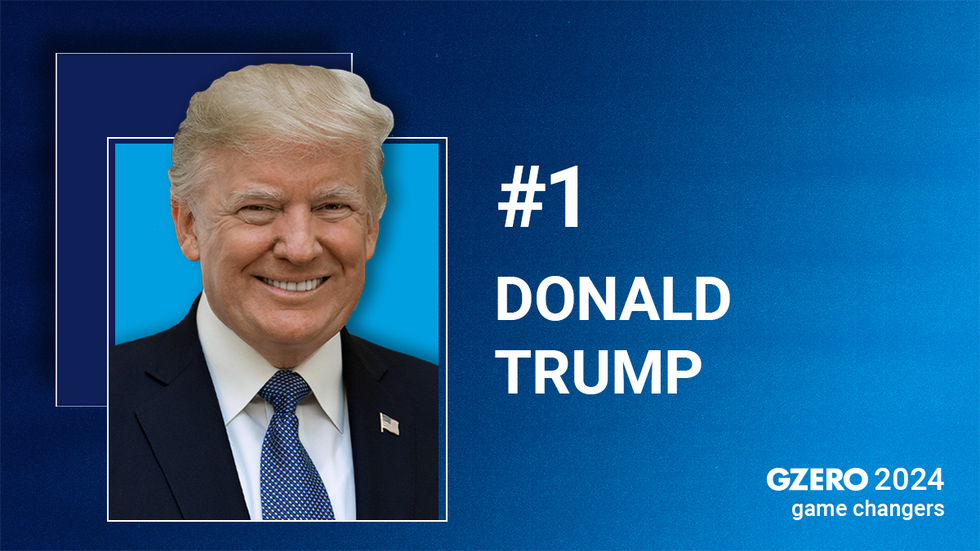
Who is he? At this point, Donald Trump – GZERO’s top political game changer of the year – needs no introduction. The New York native and real estate mogul began his political career in 2015, cementing it a year later by beating Hillary Clinton to win the presidency. But he was defeated by Joe Biden in 2020 in large part because of how he handled the COVID-19 pandemic, his harsh immigration policies, and his pattern of erratic behavior.
What did he accomplish in 2024? The former president turned president-elect is set to return to the White House after winning the electoral college and the popular vote in what was meant to be a close election. Trump is backed by a Republican-controlled Congress, a conservative majority on the Supreme Court, and a cabinet of loyalists determined to implement his policy agenda.
“Trump won the closest thing you can these days that counts as a mandate, and he’s the first Republican to win the popular vote since 2004,” says Eurasia Group’s US expert Noah Daponte-Smith. “That’s a big accomplishment, and it matters to the way he’s going to govern.”
How did he change the game? Trump’s win was no inevitability. Flash back to the Republican primaries, when he faced competition from Florida Gov. Ron DeSantis and former South Carolina Gov. Nikki Haley – until, that is, voters showed that the base remained squarely in Trump’s camp.
He prevailed despite facing 34 soon-to-be-obsolete felony convictions, the fallout from the Jan. 6 insurrection, and two states attempting to kick him off their primary ballots. In fact, in many ways, Trump used those setbacks to his advantage, spinning them to rally voters to the polls.
Trump won every swing state, accumulating the most electoral college votes for a Republican since 1988. He widened the party’s base, winning 2.5 million more votes than when he ran as the incumbent in 2020.
In doing so, he revealed the country had swung to the right, turned out a record number of young male voters, and made inroads with some Democrats – increasing his support among every demographic group besides women. He survived an assassination attempt against him and used it to further rally his party around him. The GOP is now Trump’s party, and any remaining old-school Republicans who may have opposed him have been left party-less – some even crossed the aisle to endorse Kamala Harris.
An underrated contributor to Trump’s victory was his “mastery of the new information ecosystem,” notes Daponte-Smith. “Trump’s podcast blitz in the middle of the campaign baffled many at the time but in retrospect looks to have been a deft move that enabled him to make substantial inroads among demographics that traditionally don’t lean Republican.”
What to expect from him in 2025. Even before his inauguration on Jan. 20, Trump is meeting with world leaders, compiling a cabinet of loyalists, and vowing to implement punishing tariffs on America’s allies and enemies.
In conflicts in Ukraine and the Middle East, Trump is likely to push for temporary ceasefires to demonstrate his peacemaking abilities, which may ultimately result in the partitioning of Ukraine and expanded Israeli power over Palestine. Meanwhile, he will likely restart his “maximum pressure” campaign to heavily sanction Iran.
Daponte-Smith says he is expecting Trump to make headway in three key areas: trade, taxes, and immigration. He will likely substantially raise tariffs on China in the first year while limiting illegal immigration to the US and ramping up deportations. “The tax bill at the end of the year, which will very likely extend all of the 2017 tax cuts, will be the cherry on top for Republicans, who know that trifectas tend to be short-lived and are looking to move quickly to make the most of this one.”
- 2023 game changers that weren’t ›
- Top 10 game changers of 2023 ›
- What Assad’s fall means for Syria, the Middle East, Moscow and Washington ›
- G7 meeting: Ukraine and Meloni take center stage ›
- Netanyahu's uncompromising UNGA address ›
- How will Trump 2.0 approach foreign policy? ›
- Elon Musk and the Political Power of Young Men ›
Geert Wilders, leader of the Dutch Party for Freedom party, part of the hard-right coalition government.
Hard Numbers: The Netherlands nixes asylum-seekers, Sudan strife escalates, South Koreans agitate, Beijing condemns US-Taiwan arms deal, Bulgarians vote – again
51,000: The Dutch nationalist government on Friday approved tough new migration measures in Parliament, including enhanced border checks, an end to mandatory municipal settlement of asylum-seekers, and limits on family reunification. The policy comes after 51,000 asylum applications were made in the past 12 months and reflects shifts in Italy, Sweden, and other EU nations towards tighter migration controls.
124: An attack by the Rapid Support Forces on Friday killed at least 124 people in Al-Sareeha village in Sudan, with reports of over 200 injured and 150 detained. The attack marked the latest escalation in the conflict between the RSF and the Sudanese Armed Forces, which has displaced millions and triggered a severe humanitarian crisis.
230,000: South Korean Christians held a mass protest in Seoul on Sunday to oppose a court ruling granting same-sex partners spousal health benefits, fearing it paves the way for legalizing same-sex marriage. The protest disrupted traffic as organizers claimed over a million participants, while police estimated the crowd at 230,000.
2 billion: China on Saturday condemned a $2 billion US arms sale to Taiwan, the 17th of the Biden administration to the island, vowing “countermeasures” to defend its sovereignty. Beijing warns that the deal, which includes advanced air defense systems, “seriously damages China-US relations, and endangers peace and stability” in the strait.
7: Exit polls show Boyko Borisov's GERB party leading Bulgaria’s seventh election in three years, but forming a coalition could be difficult: The last election in June produced a hung Parliament. This time, the pro-Russian Vazrazhdane party underperformed, while the Reformist PP-DB exceeded expectations. Final results are expected on Monday.EU Summit focuses on migration crisis
What is the Russian stake in the EU referendum in Moldova? What was the main outcome of the EU Summit last week? Carl Bildt, former prime minister of Sweden and co-chair of the European Council on Foreign Relations, shares his perspective on European politics from London.
What is the Russian stake in the EU referendum in Moldova?
Well, the Russians are intending quite clearly to try to secure a "no" in that particular referendum. They're throwing money at it. They are trying to bribe voters. They are having an information campaign. So it's fairly obvious that their enthusiasm for the European aspirations of Moldova are fairly limited. We'll see how that turns out. There's also presidential election, but their sitting President Maia Sandu is highly likely to be re-elected.
What was the main outcome of the EU Summit last week?
It was migration, migration, migration. That is the issue that is dominating the politics in quite a number of European countries. And fairly obviously, it requires European solution. There have been agreements on the migration pact, not yet implemented fully. But clearly there's urge for further measures to sort of have a higher fence if possible. That's easier said than done. But also measures to send back to different countries the people who have no right to stay in Europe. So, Europe needs a higher fence, yes, that was the conclusion. But Europe also needs, as a matter of fact, a door, a fairly big door, because we have a demographic situation, a declining working age force in the years and in the decades ahead. So it's a huge issue. It's one difficult to balance, but clearly dominated the EU Summit.
Prime Minister of Poland, Donald Tusk gestures while speaking during the weekly Ministerial meeting in Warsaw.
Poland scraps right to asylum
Polish Prime Minister Donald Tusk in recent days unilaterally suspended the right to asylum for migrants crossing into Poland from neighboring Belarus. Tusk said the move is temporary, meant to stop Russia from directing flows of migrants towards Poland in an effort to destabilize the country. In recent years, Poland and Belarus have nearly come to blows over the issue.
The decision, which has raised concerns among human rights groups, comes just before a major EU summit focused in part on crafting a coherent migration policy that balances the bloc’s supranational human rights laws with national-level concerns about rapid immigration from the Global South. In recent weeks, Germany, the bloc’s largest economy, imposed fresh border checks of its own.
Note: Tusk is no ultra-nationalist. A centrist former European Council president, Tusk was elected last year on a wave of discontent with the long-ruling, far-right Law and Justice party. But in Poland – as elsewhere in the decade since a wave of refugees from the Syrian civil war arrived – calls for tighter immigration policy have moved from the right-wing fringe to the mainstream discourse.
All of this as the numbers are actually falling. Illegal crossings detected byEU border authorities fell 42% in the first nine months of 2024, compared to the same period last year, authorities say. Migrant voyages via the Mediterranean fell drastically, but they in fact rose along eastern routes into the Czech Republic and Poland.
Looking ahead: EU leaders will meet to discuss the issue on Wednesday and Thursday.UK Prime Minister Keir Starmer meeting with Italy’s Prime Minister Giorgia Meloni.
Starmer asks Meloni for a lesson on curbing illegal migration
UK Prime Minister Keir Starmermet with Italy’s Prime Minister Giorgia Meloni on Monday to learn how her hard-line tactics against irregular migration could help him deliver on his election promise to “smash the gangs” driving such migration to the UK. The meetings came after eight migrants died crossing the English Channel on Sunday and on the heels of disinformation-fueled anti-immigrant riots in August.
Starmer is interested in how Meloni cut irregular sea crossings to Italy by 60% over the past year, and in the so-called “Rome Process” she adopted last year when she forged deals with North African countries like Tunisia and Libya to tackle people-smuggling gangs, intercept departing boats, and return migrants. Starmer pledged £4 million to support the Rome Process. He also said he was open to following Italy’s lead on processing asylum claims offshore — a project Meloni is struggling to get off the ground in Albania but one that has generated the interest of leaders across Europe, including in Brussels.
The meeting shows how Starmer has changed his tune on immigration since campaigning against Rishi Sunak’s plan to deport illegal migrants to Rwanda. It also signals how Europe's shift to the right on immigration has positioned Meloni’s tactics – once considered fringe – in the mainstream.

